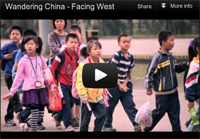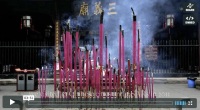The big question I ask myself when I read this was simple – what if China is not out to rule the world? It is almost sad to read about how so many academics are creating polarities today to sell their books and ideas. More us and them? What for? One really has to question intentions when one seeks to polarise. We really have to. But what is very true is this – if China collapses, that will be the real true threat to the status quo.
– – –
Why China Won’t Rule the World
by Minxin Pei
Source – Newsweek, 08 December 2009

Fang Xinwu / Color China Photos-ZUMA Press
Conventional wisdom can be devilishly hard to dispute. For example, most pundits agree that the Great Recession helped China more than any other state. At first glance, this claim seems obviously true. Unlike the United States and the other major Western powers, which saw their economies plummet and their financial institutions come close to ruin, the Chinese economy has kept on growing. Chinese financial institutions, considered technically insolvent only a few years ago, now boast balance sheets and market capitalizations that Western banks can only dream of. With its economy expected to grow at 9 percent in 2010, China will soon surpass Japan as the world’s second-largest economy (measured in U.S. dollars). Pundits like Martin Jacques, a veteran British journalist, are predicting that China will soon rule the world—figuratively, if not literally.
Yet before declaring this the Chinese century, you might want to take another look at what’s actually taken place in the country over the past year.
One of the strangest things about predictions of Chinese dominance is that they tend to impress everyone but the Chinese themselves. Take China’s supposedly miraculous economic recovery. While the international business community has practically run out of words to praise Beijing’s handling of the crisis, Chinese leaders haven’t stopped worrying. They fret that their banks have gone on a reckless lending binge; Liu Mingkang, China’s chief bank regulator, warned in September that “all sorts of risks have risen” as a result. He’s right. In the first half of 2009, Chinese banks shelled out roughly $1.2 trillion, creating a potential tidal wave of future nonperforming loans. State-owned enterprises (SOEs) used much of the money to speculate in the real-estate and stock markets and to make questionable expansions; as a result, Dragonomics, a Beijing-based consultancy, now estimates that as much as one sixth of all the bank loans made between 2008 and 2010 could end up not paying off. Yet Beijing is still wary of shutting off the spigot, lest China prove unable to keep growing without it.
Its leaders’ frequently voiced trepidation may be overstated. Perhaps the officials are simply being modest or trying to soothe Western worries about the so-called China Threat. It’s far more likely, however, that China’s leaders are actually telling the truth. They know their country has indeed pulled off the world’s most impressive recovery. But they also know that’s a relative -accomplishment—and China has paid a huge long-term price in the process. In addition to sowing the seeds for future dud loans, its investment-focused stimulus policies have exacerbated the country’s economic imbalances by creating new productive -capacities—factories and the like—without really boosting China’s anemic household consumption. In other words, Chinese plants may be cranking out even more TVs, cars, and toys than before, but no Chinese are buying them. Loosened bank credit has mainly benefited SOEs, allowing these inefficient behemoths to expand at the expense of the private sector, which has been given little access to the government’s largess.
Meanwhile, China has yet to confront what has become an enormous overcapacity for producing cheap goods. During the boom, when Americans were hungry for these products, Chinese exports registered double-digit growth year after year, accounting for nearly a quarter of the country’s net GDP growth. Now that nervous and debt-ridden U.S. consumers have virtually shut their pocketbooks, China can no longer expect them to snap up its wares. To account for this change, Beijing must embark on some painful restructuring, shuttering many export–oriented factories and strengthening the social safety net to boost household consumption (which remains stuck below 40 percent of GDP). China’s leaders know all this. But they’ve yet to take the plunge.
Dig a bit deeper, and it becomes very difficult to pin down just how exactly China has gained so much from the crisis. Its failures are much more evident. Take Beijing’s lack of success in snapping up prized assets overseas. For several years, Chinese leaders have aimed to secure foreign natural resources by acquiring effective control of or stakes in oilfields, mining companies, and commodity producers in other countries. Beijing is convinced that such moves are essential for its long-term security. Yet opposition by Western politicians, entrenched multinationals, and vigilant governments in developing countries has stymied many attempts by cash-flush Chinese SOEs to execute their government’s master plan. During the first months of the crisis, these SOEs and China’s sovereign-wealth fund did nab modest stakes in a few minor natural-resource companies. But they failed to score a big hit, and there were some embarrassing failures. In late 2008, for example, Chinalco (a state-owned Chinese aluminum company) reached a tentative agreement to pay $19.5 billion to increase its stake in Rio Tinto, a global mining giant. But fierce shareholder opposition and the skepticism of Australian regulators doomed the deal, to Beijing’s intense frustration. To borrow a colorful Chinese proverb, Chinalco saw its “cooked duck fly away.” This ignominious setback served as an uncomfortable reminder of the humiliation of 2005 when CNOOC, one of China’s state-owned oil companies, was prevented from taking over Unocal, an American energy producer, by congressional opposition.
Another puzzle: if China is so strong, why doesn’t it show more leadership in addressing global problems? While Chinese officials show up at almost every important gathering of world leaders, and their opinions and support are eagerly solicited, they consistently maintain a low profile, preferring to focus on guarding their national interests and skipping opportunities to showcase their soft power. At the G20 summit in London in April 2009, for example, the only thing China cared about was keeping Hong Kong off the list of offshore tax havens being scrutinized. Beijing’s coffers may be bulging with $2.1 trillion in foreign-currency reserves, but it is not exactly offering to spend that cash on common crises. Besides calling for a new international reserve currency, China has remained mostly silent on how to reform the global financial system. Nor did it take charge in advance of the make-or-break Copenhagen climate-change conference in December 2009. Beijing’s foreign policy remains stuck in a reactive mode; if this is a superpower, no one’s told the Politburo yet.
Still, most Chinese leaders seem unconcerned with their inability to translate strength into real gains on the international stage. That’s because they’re far more concerned with domestic stability. Yet here again the news is hardly reassuring. Antigovernment riots and collective protests throughout China are on the rise. Corruption remains rampant. More than a dozen senior officials, ranging from a vice minister of public security to several CEOs of giant SOEs, were arrested in 2009. The political maneuvering for the next succession, due in 2012, has already begun, making Chinese leaders all the more cautious—even a tiny misstep between now and then could be politically catastrophic.
The worst news on this front has been the reemergence of ethnic separatism in China’s restive, but resource-rich, border regions. The bloody riots of July 2009 in Urumqi, the capital of Xinjiang, killed nearly 200 and wounded more than 1,000, making it China’s worst ethnic conflict in three decades. Coupled with the Tibet problem, the challenge by the Uighurs to Chinese rule will preoccupy the minds of Beijing’s ruling elites for years to come—and keep their sights firmly fixed on matters domestic.
All this helps explain why, while China’s leaders may be mightily relieved to have escaped the worst consequences of the world economic crisis, they see no cause to celebrate. True, the crunch enabled China to close the economic gap with its badly ravaged rivals, particularly the U.S. and Japan. And popular perceptions of new Chinese strength have allowed China’s leaders to bask in the global limelight and flaunt their elevated international status to the Chinese public. Deep down, however, Chinese leaders are no fools. They understand perfectly well how tough are the challenges they still face—and how quickly fortune can turn. If only foreigners knew this as well. Of course, the Chinese are thrilled that everyone thinks they’re the biggest winner. The truth, however, is that they’re more like the least-bad losers—and they know it.
Pei is the Tom and Margot Pritzker ’72 professor of government at Claremont McKenna College.
Filed under: Economics, Newsweek, Soft Power











The Sharing Circle